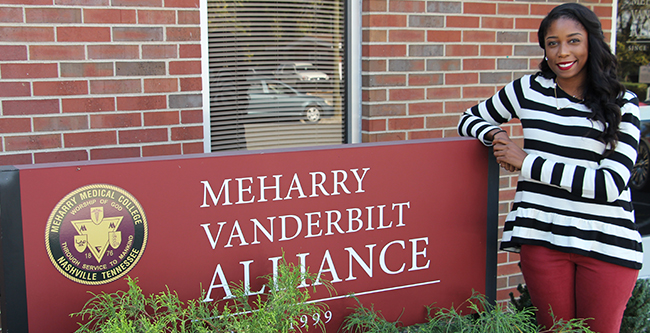
Photo by Matt Schorr
Cha'koya Smith interned with the Meharry-Vanderbilt Alliance to work in Community Engagement.
NASHVILLE, Tenn. Cha’koya Smith joined the Meharry-Vanderbilt Alliance as an intern in November 2016 after learning about the organization’s efforts working with the community. The MVA’s work in Community Engagement appealed to her because she believes it’s important to understand your community as much as possible.
The Arkansas native is currently seeking a Masters of Science in the Public Health Program at Meharry Medical College. It will be her second masters degree.
Smith hails from Wrightsville, Ark., just under 15 miles from Little Rock. She attended the University of Fayetteville-Arkansas and majored in biology, immersing herself in student life by involving herself in the university’s health center. From there, she went to the University of North Texas and earned a Masters in Higher Education.
What led you to Meharry’s Master of Science in Public Health Program?
I always had a passion for health. Even as a student and undergrad, I engaged heavily with our health center at the University of Arkansas. I had intentions of going to dental school, but my passion became healthcare once I was more exposed to it.
There’s so much more to healthcare than just being a physician, and you don’t have to be a doctor to make an impact. When I got my first masters in Higher Education, my focus in that program was in student health. Whenever I did research or papers, I focused my work on health, whether that was mental health for students or minorities, anything to do with health.
So when I graduated from that program, it made sense that I get a degree in public health. Not that that first degree wasn’t enough, I just felt I wasn’t as prepared as I could have been. And that’s what led me to Meharry, which had been on my radar for a number of years. My advisor recommended it when I was interested in dentistry, so it’s interesting how it came full circle.
How did you learn about the Meharry-Vanderbilt Alliance?
We had an externship class where we had speakers talk to us about volunteering or internships in the summer, and a representative came to our class to talk about the work the MVA was doing in the community. That really interested me, just because I wanted to immerse myself in the Nashville community. I think it’s important to know where you are, and I think it will help you in programming and communicating with other people, and having a better understanding of the community that you’re serving.
So I contacted them and scheduled an interview, and I’ve been interning with them for over a year now.
What led you to community engagement?
An interest of mine that came about as I was going through the program at Meharry was Faith and Health, and I learned MVA has a Faith and Health Workgroup that was working on a project looking at congregational health network models. That really interested me. And so I worked last year gathering info and benchmarking other templates and tools that people were using around the country to benefit congregations.
What insights have you gained through your work?
Everything is very deeply connected. So when interning with the MVA, I’ve come to understand how congregations are the hub of many things that happen in communities. It’s where people go to worship, where they get information that sometimes has nothing to do with the church itself. It’s where people can go to be helped.
That really broadened my understanding of what partnerships I could form in the future and engaging the community, with getting messaging out to people, primary prevention, things like that.
Has anything in particular stuck with you during your time here?
Recently I was sitting in a Faith and Health Workgroup meeting at MVA, just sitting in that meeting listening to Nashville General Hospital CEO Dr. Joseph Webb describe the initiatives they’re starting. Community health workers, pastors and more are all in the room. It made me understand the importance of collaboration when trying to help communities and populations as a whole. That’s the main thing I’m taking away, the importance of collaboration and how much you can get done when you bring everyone to the table. You’re broadening your impact.
Where do you go from here?
I’m currently in the process of interviewing for a Health Administration Fellowship. I hope to incorporate my interests in the future of my career and also take my value of personal faith and spirituality and incorporate that in the work that I do in the future.
What is your ultimate goal in this field?
I’m not sure if it’s something that will be realized in my time, but I will always and forever continue to work toward health equity and reducing the negative effects of social determinants of health in our communities.
Smith will graduate from the Meharry Medical College Masters of Science in Public Health Program in May 2017. The Meharry-Vanderbilt Alliance convenes the Faith and Health Workgroup, which is an initiative of the Nashville Health Disparities Coalition. For more information about the Faith and Health Workgroup, please contact Elisa Friedman at elisa.c.friedman@meharry-vanderbilt.org.
About the Meharry-Vanderbilt Alliance
Founded in 1999, the Alliance bridges the institutions of Meharry Medical College and Vanderbilt University Medical Center. Its mission is to enrich learning and advance clinical research in three primary areas -- community engagement, interprofessional education and research -- by developing and supporting mutually beneficial partnerships between Meharry Medical College, Vanderbilt University Medical Center and the communities they serve. Through community engagement, the Alliance serves a large community of stakeholders including surrounding universities and colleges, community organizations, faith-based outlets and community health centers. Its interprofessional education enhances students' interdisciplinary understanding and improves patient outcomes through integrated care. The research conducted provides access to experienced grant writers and materials supporting the grant application process and facilitates grant-writing workshops.



